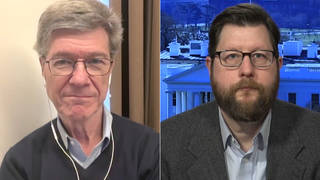
Related
Guests
- Jane Houlihanvice president for research at the Environmental Working Group and creator of the Skin Deep database
We speak with Jane Houlihan, vice president for research at the Environmental Working Group and the creator of Skin Deep, an online cosmetics safety database. The database provides safety ratings for more than 62,000 products on the market and receives about one million hits per month. [includes rush transcript]
Transcript
AMY GOODMAN: We’re also joined from Washington, DC, by Jane Houlihan, the vice president for research at the Environmental Working Group and the creator of Skin Deep, which is an online cosmetics safety database. The database provides safety ratings for more than 62,000 products on the market and receives, oh, more than a million hits per month.
Jane Houlihan, we want to thank you very much for joining us. Explain what this database is. How can people use it? And what is it based on?
JANE HOULIHAN: It’s at cosmeticsdatabase.com, online. We launched it in 2004. It contains safety reports for 60,000 products on the market. It’s backed up by government studies and testing that give you in-depth information about what exactly is in your products. When you get online and use it, you’ll find more than 500 products that contain ingredients that are banned in other countries. You’ll find a hundred products that contain ingredients that the industry itself has said are unsafe in cosmetics. And you’ll find that 99 percent of the products you find in our database contain at least one ingredient, and many times dozens of ingredients, that haven’t been assessed for safety by the FDA, by the cosmetics industry itself, or any other publicly accountable institution. Like your previous guest, Stacy Malkan, you can log on, look up your products, and see how many cancer-causing chemicals are in your products, how many compounds linked to hormone disruption and other basic health problems. This is an industry that’s self-regulated, largely, and what we find across the industry, with our Skin Deep database, is that companies are making very different choices about what’s safe enough to use in these products.
ANJALI KAMAT: Jane Houlihan, who are the worst offenders? What would you say are the most dangerous products that are very commonly used?
JANE HOULIHAN: Dark permanent hair dyes are linked to cancer. When you use those for a long time over your lifetime, those can be quite toxic. Nail care products tend to contain some of the most hazardous ingredients. But we also find carcinogens in baby products. We find skin lighteners that contain chemicals linked to cancer. So, a really broad range of issues. One very problematic area is sunscreens, which are poorly regulated in the US. We found that we could recommend only eight percent of sunscreens on the market that could really give you broad spectrum protection you need to prevent — help prevent skin cancer and also that don’t contain hazardous ingredients that can seep through the skin and pose other kinds of health concerns.
AMY GOODMAN: When you’re looking, for example, at sunscreen, what should you avoid? What are the eight percent that you recommend?
JANE HOULIHAN: You should look for zinc and titanium. Those give you good broad spectrum protection. You should avoid a very common sunscreen chemical called oxybenzone. That’s a potent hormone disruptor, potential hormone disruptor for people. It’s in about 60 percent of all products. And this year we’re also recommending that you avoid vitamin A in sunscreen. We think of vitamins as very good for us, but on the skin, a new FDA study shows that vitamin A could actually increase the risk for skin cancer when it’s applied on the skin.
AMY GOODMAN: What is the hope? What are people to do — men and women, girls and boys, infants?
JANE HOULIHAN: Right now, it’s very much a “buyer beware” market. Our work since 2004 shows that so many products contain ingredients that flat-out haven’t been assessed for safety in a public way, so companies are making their own decisions. What we really need is change at the top level, where we’re seeing in federal law a safety standard for cosmetics, so these companies have a level playing field, and so when you go to the store, you know that what you’re pulling from the shelf is safe enough to use. Right now what we have is a system that requires each one of us to get educated on what’s in our products. You can use Skin Deep to get easy-to-use, free safety reports for the products you use every day and search for safer products that way. What we need, in the end, is a system that, at the very highest level, ensures that we have safe products on all of our store shelves for everyone in our families.
AMY GOODMAN: The website is cosmeticsdatabase.com?
JANE HOULIHAN: Cosmeticsdatabase.com is the website. You’ll find 60,000 products, about 8,000 ingredients, and free online safety reports there that are easy to use and great for finding safer products and helping you bring safer products into the home for your family.
AMY GOODMAN: Jane Houlihan, I want to thank you very much for joining us, vice president for research at the Environmental Working Group and creator of the Skin Deep database.












Media Options